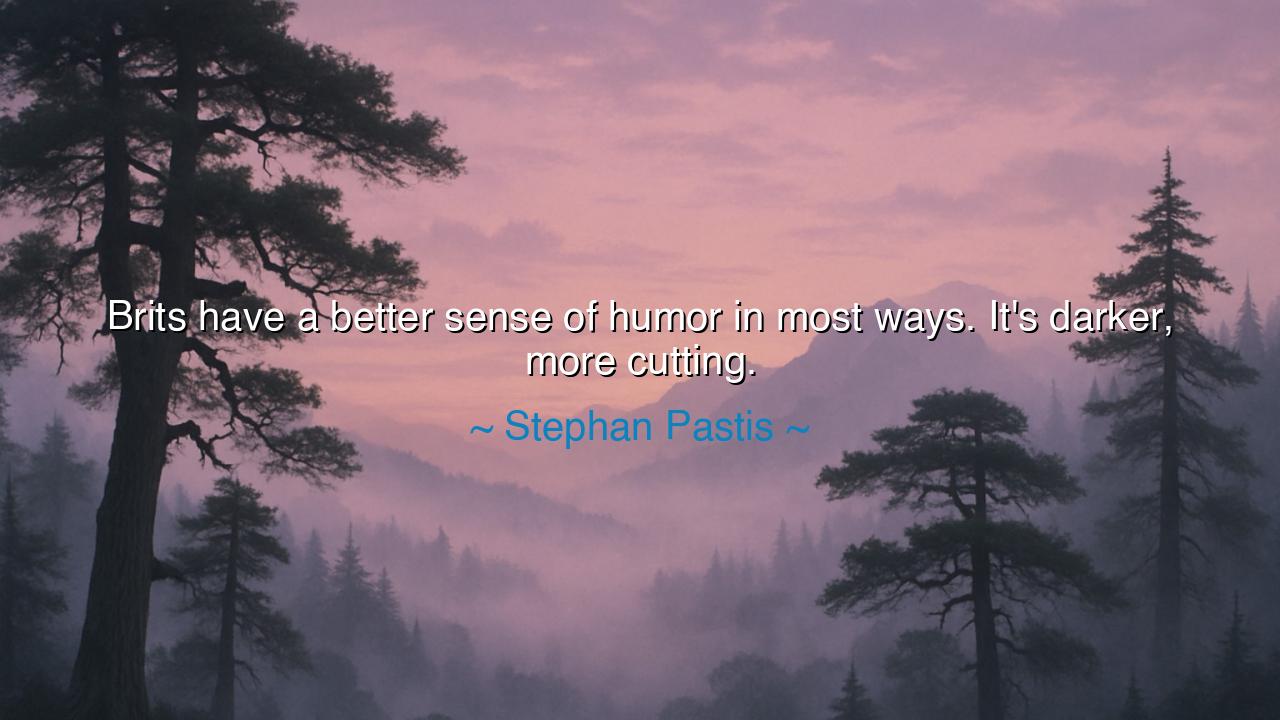
Brits have a better sense of humor in most ways. It's darker






The words of Stephan Pastis — “Brits have a better sense of humor in most ways. It’s darker, more cutting.” — carry the weight of a keen observer, a man who has studied laughter not merely as sound, but as spirit. In this simple reflection lies a profound truth about culture, suffering, and the strange alchemy of wit. Humor, like light, takes its color from the atmosphere in which it is born. The humor of Britain — dark, cutting, and sharp as steel — was forged in centuries of hardship, irony, and restraint. It is laughter born not from denial, but from endurance; not from naïveté, but from wisdom.
To understand the British sense of humor, one must first understand the people who shaped it — a people who learned to smile beneath gray skies, who built empires yet mocked themselves as they did so, who faced war, loss, and rationing with a stiff upper lip and a well-timed quip. Their dark humor is not cruelty but courage — the laughter of those who know that tragedy and absurdity are constant companions. The cutting edge of their wit is not meant to wound, but to reveal; it slices through hypocrisy and pretense like a surgeon’s knife, leaving truth bare and glimmering.
This kind of humor finds its roots deep in history. In the bleakness of World War II, when bombs fell upon London and the nights were filled with fear, the people of Britain did not abandon laughter. Posters bore slogans like, “Keep Calm and Carry On,” and soldiers at the front wrote letters filled with jokes about mud, hunger, and death. It was not denial — it was defiance. To laugh at darkness is to rob it of its power. Thus, the British sense of humor became a weapon of the spirit — dark, because it faced the abyss without flinching; cutting, because it revealed the absurdity even in despair.
This tradition carried into their art. Writers like George Bernard Shaw, Oscar Wilde, and later Douglas Adams and Monty Python turned irony and satire into instruments of enlightenment. Their humor exposed human folly, yet always with an undercurrent of affection. Shaw once said, “If you want to tell people the truth, make them laugh, otherwise they’ll kill you.” Here lies the essence of what Pastis calls “better” — not superior, but more seasoned, more profound. The British wit carries pain within it, yet never allows pain to rule it. It teaches that laughter can coexist with melancholy, and that wisdom is often wrapped in jest.
In contrast, the humor of other cultures — like that of America — is often bright, optimistic, and exuberant. It celebrates possibility and mocks authority with youthful irreverence. The British humor, however, bears the maturity of a civilization that has seen both greatness and ruin, glory and decay. It knows that life’s beauty lies not in perfection, but in contradiction. To laugh while standing in the rain, to joke about death while cherishing life — that is the mark of the dark humor Pastis admires. It is the laughter of those who have accepted the world’s brokenness and chosen to love it anyway.
There is a story told of Winston Churchill, whose wit could cut like a blade yet comfort like a friend. When told by Lady Astor, “If I were your wife, I’d poison your tea,” he replied, “Madam, if I were your husband, I’d drink it.” Such is the essence of cutting humor — swift, brilliant, but without malice. It disarms hostility by turning it into theater. It reminds us that even in conflict, wit can triumph over wrath. Churchill’s humor, like that of his nation, was a shield wrapped in irony — a way of meeting life’s hardships with poise, not bitterness.
The lesson, dear listener, is this: learn to see laughter not as escape, but as power. Let your humor, like that of the British, be both dark and kind, both cutting and wise. Laugh at yourself before you laugh at others; in doing so, you become untouchable. When life grows heavy, sharpen your wit instead of your anger. When despair whispers in your ear, answer with irony. The ancients said that to laugh at fate is the highest act of freedom — for the one who can laugh cannot be enslaved by circumstance.
And so, take Stephan Pastis’s words to heart. Cultivate a sense of humor that has depth, that can withstand storm and shadow. Let it be dark, not because you love pain, but because you have learned to master it. Let it be cutting, not because you seek to hurt, but because you seek to reveal truth. For laughter that springs from wisdom is a kind of light that even the darkest sky cannot extinguish — and in that laughter, humanity remembers its courage.






AAdministratorAdministrator
Welcome, honored guests. Please leave a comment, we will respond soon